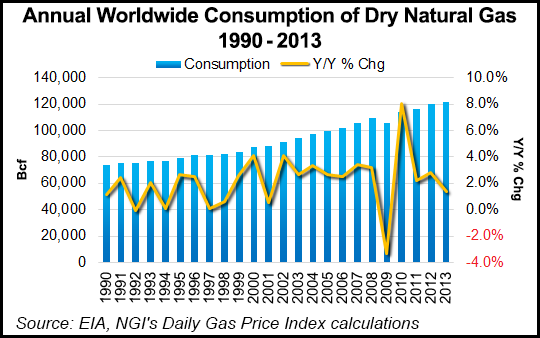Stanford Launches Global Natural Gas Research Effort
An interdisciplinary team at Stanford University has launched a global natural gas initiative, bidding to answer the question of how the world can make better use of resources for environmental, economic and energy security advances.

The initiative is headed by a geophysics professor Mark Zoback and initially would include 35 professors and research staff from a dozen academic departments at the Northern California university in Palo Alto.
“If developed in a responsible manner, natural gas can be the critical transition fuel that reduces the environmental impacts of fossil fuels and keeps us on a path toward a decarbonized energy future,” Zoback said.
The comprehensive effort is driven by the fact that U.S. gas production has risen by nearly 50% in the past 10 years, and global demand for gas in the future is anticipated to outpace all other fossil fuels, according to officials.
Longer term, the initiative would seek donations from individuals, corporations, nongovernmental organizations and foundations. The team includes Bradley Ritts, a former executive with Chevron Asia Pacific Exploration & Production Co., and the former head of the Colorado Oil & Gas Association, Tisha Schuller, who are Stanford graduates.
Research would tackle environmental and social issues from fugitive methane emissions to hydraulic fracturing (fracking). Four inaugural research projects have been identified to begin the multi-disciplinary, multi-year effort:
“Making the most of our natural gas resources and making sure they provide the environmental benefits we seek will require much more than technology,” said Stanford’s Sally Benson, director of the Precourt Institute for Energy. She said “good policies, international engagement and a rich dialogue with key stakeholders” would be critical for the ambitious initiative to be a success.
Stanford’s Pamela Matson, dean of the School of Earth, Energy and Environmental Sciences, said the ongoing growth in gas is presenting “both opportunities and challenges,” and the university’s expertise in engineering, geophysics, water resources, environmental science, economics, policy and law would allow it to be focused on both.
One of the first research funding packages is to go to environmental earth system science professor Robert Jackson and and Adam Brandt, an assistant professor of energy resources engineering, who are developing ways to detect methane leaks.
Researchers and staff are seeking to build on the shale boom and the technological advances that have driven it, but they are also mindful that unconventional drilling has “unleashed anxieties about contaminated drinking water, induced earthquakes and lenient regulation,” the university noted. Communities in and around shale plays have been strained by the boom, they contend.
“Natural gas must be developed with safeguards to reduce impacts on water, air quality, land, nearby communities and ecosystems,” Zoback said. “While we have to meet both short-term energy and economic needs, we also need to meet society’s long-term environmental goals.”
© 2024 Natural Gas Intelligence. All rights reserved.
ISSN © 1532-1231 | ISSN © 2577-9877 |
